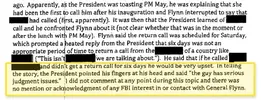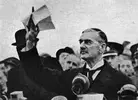Four days before memos written by former FBI director James B. Comey leaked to the press, President Trump tweeted that the documents are “phony” and “FAKE!”
Yet after the memos became public on Thursday night, Trump held them up as proof that “there was NO COLLUSION and NO OBSTRUCTION.”
Trump mischaracterized the memos, which, in fact, present no conclusions about whether he obstructed justice or headed a political campaign that coordinated with Russia during the 2016 election.
But what is notable, besides the president's factual errors, is that he cited Comey as a credible source. Though he had previously wanted the memos discounted, Trump suddenly reversed and wanted the documents seen as authoritative.
The reason for the change is obvious: When Trump expected the memos to be all bad for him, they were “phony.” And when he saw the memos as an opportunity to profess his innocence, they were reliable. As he often does, Trump measured truth by a single standard: favorability.








